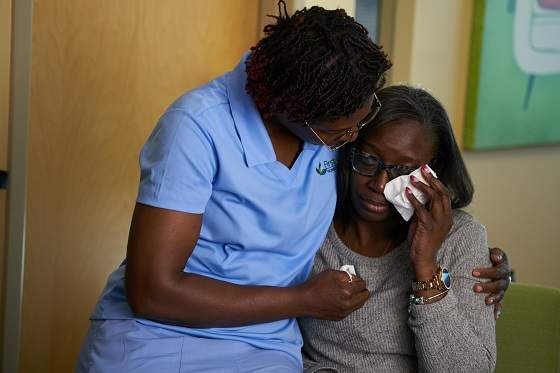For many, it’s hard to tell the difference between caregiver burnout and compassion fatigue, but there is a difference.
Compassion fatigue occurs initially when caregivers cannot remove themselves from their loved one’s condition long enough to recover from the stress they feel when attending to another person’s needs. The caregiver can feel trapped and overwhelmed and can experience guilt, trauma, and depression.
Compassion fatigue can come on suddenly and often includes:
- Exhaustion (physical and/or emotional)
- Feelings of dread or guilt
- Irritability, anxiety or anger
- Difficulty sleeping
- Difficulty making decisions
- Feeling disconnected
- Trouble finding meaning in caregiving
- Self-isolation
Caregiver burnout, however, is a state of physical, emotional, and mental exhaustion. It often occurs because caregivers, over a long period of time, are so busy caring for others that they tend to neglect their own emotional, physical and spiritual health.
Caring for an aging loved one is demanding and it can become overwhelming. Burnout develops over time because the caregiver does not get the help they need, or they try to do more than they are either physically or financially able to do. Symptoms of caregiver burnout are like those you experience when under stress or feeling depressed. Warning signs also may include:
- Withdrawal from friends and family
- Loss of interest in activities previously enjoyed
- Feeling blue, irritable, hopeless and helpless
- Changes in appetite, weight, or both
- Changes in sleep patterns
- Getting sick more often
- Feelings of wanting to hurt yourself or the person for whom you are caring
- Emotional and physical exhaustion
- Excessive use of alcohol and/or sleep medications
- Irritability
If you or the family caregiver in your life is dealing with compassion fatigue or caregiver burnout, there are several things that may help reduce these feelings.
- Take care of yourself by scheduling time away from caregiving. Ask other family members or friends to step in while you step out for an hour or two of “you time.”
- If you don’t have a family to support you, or you need more structure in your caregiving to allow for some personal time, consider respite care provided by professional and compassionate caregivers.
- Eat right, exercise and get plenty of sleep.
- Seek professional care to address any medical or mental health issues you are experiencing.
- Find a support group and talk with other caregivers to find out about local resources in your area, build friendships, and to help you realize you’re not in this alone.
FirstLight’s respite care and other senior care services can help you find the “you” you’ve been missing without compromising the quality of care and attention your family member needs.
The very nature of home care makes it the safest care environment for our elderly clients during this uncertain time. We remain available to provide much-needed care to the people who need us most. We can even run errands, deliver food and supplies or pick up prescriptions. If you need our help, find a location near you.
SOURCE:
WebMD: www.webmd.com
AARP: www.aarp.org
Compassion Fatigue Awareness Project: www.compassionfatigue.org
Psychology Today: www.psychologytoday.com
